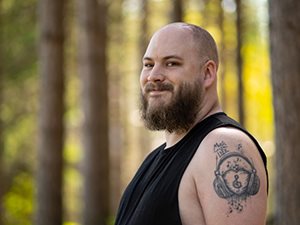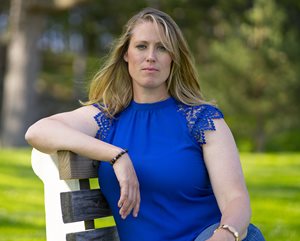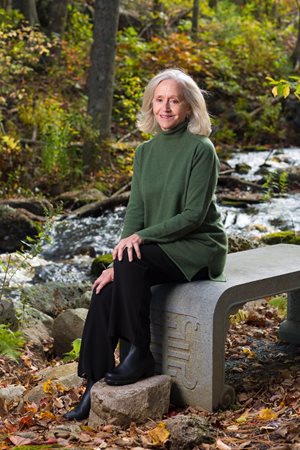Acadia Stories
 Paul S.
Paul S.
Paul has struggled with depression for most of his life. He was first hospitalized at Northern Light Acadia Hospital at age 10.
Throughout his journey, Paul has found that access to the help he needed wasn’t always readily available. “There were times when I was a teenager that I needed to be hospitalized but beds weren’t available. I’d spend days, sometimes weeks, in the emergency department waiting for an open bed. The staff would make sure I was safe and physically took great care of me, but it was very frustrating to know that I wasn’t getting the mental health services I needed. The sooner you can get help the sooner you can begin healing and move forward with life,” Paul recalls.
Paul is grateful for the care he has received from Acadia through the years. “Acadia became like a second home for me in many ways. As serious as my situation was, it was actually quite a wonderful experience. I wouldn’t be where I am today without their help.” Today, Paul is working towards a career in healthcare. Paul explains, “I grew up in the healthcare system and I’m thankful for the help I received. I want to be able to give back if I can.”
Unfortunately, Paul’s story isn’t unique. Every day, children, teens and adults across the state of Maine are housed in emergency departments waiting for access to mental health services. The Acadia For All campaign will directly improve access, and reduce the number of children waiting in emergency departments for mental health services.
 Emerald F.
Emerald F.
An adventurous spirit in her twenties, Emerald had been living in Bali when introspection of past trauma, combined with the lack of mental health resources on the island, created a perfect storm. She recalls, “I was in the middle of paradise having a significant mental breakdown.” As suicidal ideation took hold of her, Emerald knew she needed to seek help.
Thankfully, Emerald was able to get the help she needed through an inpatient program in the States and came out with a well-managed medication plan. Emerald was thriving.
After moving back to her home state of Maine, Emerald was only eight weeks away from the end of the year and the end of her insurance coverage. She hit several roadblocks over many months in an attempt to refill her medications before it lapsed. Lost, and unable to find outpatient support, Emerald knew that she could not afford to go back to the dark places she had been before treatment.
By New Year’s Eve, after weeks of effort, she still did not have a way to refill her medication and the clock was ticking – quite literally. “I went from the calm, polite patient asking for help to a panicked, hysterical patient begging for someone to hear me.” That night, she sat in the emergency department mid-crisis where she was once again told they couldn’t help her.
At the eleventh hour, through her own commitment and determination, as well as a series of events she calls pure luck, Emerald would get the prescriptions she needed. However, this would be a turning point for her, as she experienced first-hand the lack of emergency psychiatric services in Maine.
Since this experience, Emerald has become a wife, a mother, and an entrepreneur - raising two children and running two successful businesses. She’s also become an established patient of outpatient behavioral healthcare provided by Acadia Hospital and a mental health advocate, sharing her story whenever the opportunity presents itself. Reflecting on her experience and why she’s supporting the Acadia For All campaign, Emerald states, “It’s imperative that when someone reaches that critical point of asking for help, they aren’t turned away. We have to improve access to ensure everyone can get help when they need it.”
 Adelaide V.
Adelaide V.
In April of 2019, Adelaide reached a breaking point. Just shy of her eighteenth birthday, she isolated herself from family and friends and restricted her food intake. Frightened and unsure of what was happening to her body, Adelaide's family reached out to Northern Light Acadia Hospital.
Adelaide was diagnosed with an eating disorder, the first step in what would become a months-long journey that included outpatient treatment at Acadia's Eating Disorders Program. Adelaide benefitted from one-on-one therapy with a licensed clinical social worker, group therapy, and consultation with a dietitian.
“I'm so thankful for the connections I've made and for the people who have helped me to get to where I am,” she says. “If not for Acadia Hospital, I would not be here today.”
Today, Adelaide is thriving as a college student studying English and psychology in Massachusetts.
 Camilla C.
Camilla C.
“Bob loved life. He looked at life as if it were a playground,” says Camilla, best friend and partner of Robert (Bob) Strauss, who lost his life to frontotemporal dementia, a rare neurodegenerative disease, in 2018.
After learning of the diagnosis, Bob and Camilla committed to living full lives for as long as possible while enjoying their beautiful home in Brooksville, Maine. They turned to Dr. Clifford Singer and the team at Acadia's Mood and Memory Clinic to access treatment and a clinical trial to slow the course of the disease.
“I just wanted to keep the 'he' of him there, and I think that we did, with the help at everyone at Acadia,” says Camilla. “From the minute I walked in there, I had hope for the first time. It was wonderful for Bob because he received respect. He was treated as a person.”
Thanks to a generous donation by Camilla, Acadia's clinical research program is now named the Robert C. Strauss Program for Clinical Research in Neurocognitive Disorders. "We always focused a lot of our philanthropic efforts on the sciences and education, and this pulls it all together," says Camilla.
We are incredibly grateful to Camilla for her support of the Acadia for All campaign.